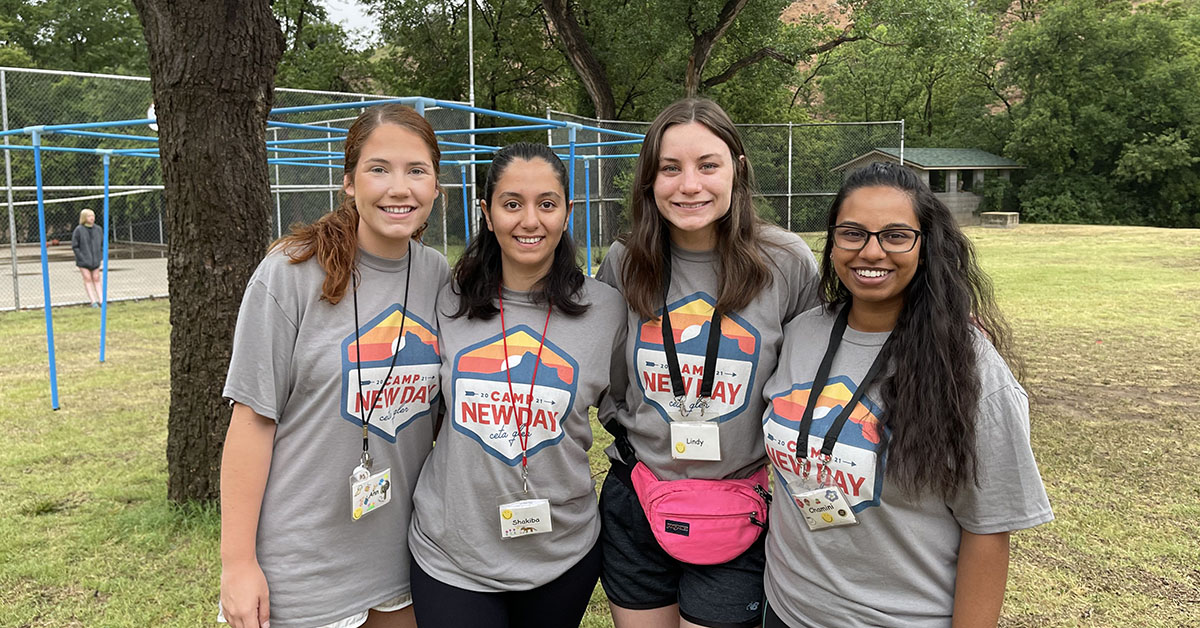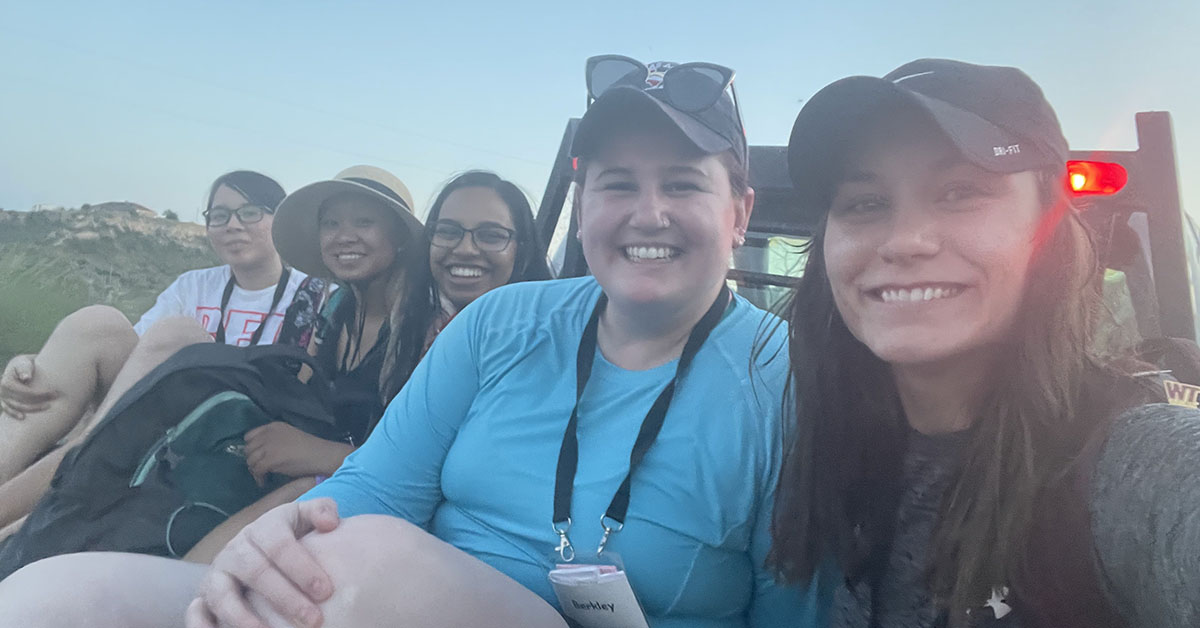TTUHSC Faculty and Students Use Fun Environment to Help Children Manage Diabetes

Summer camp is often associated with carefree fun but for children with diabetes it can be a challenge. Having to self-monitor in a camp setting where a disease state like diabetes is impacted by an increase in physical activity—and not having access to the appropriate medical personnel or supplies— can make the carefree fun of summer camp almost impossible and even dangerous.
That is where Thomas Parker, PharmD, and Camp New Day come in. Camp New Day is a non-profit summer camp for children with diabetes that was originally started over 35 years ago. Parker, an Assistant Professor of Pharmacy Practice in the Pediatrics Division at the Texas Tech University Health Sciences Center (TTUHSC) Jerry H. Hodge School of Pharmacy, took over as co-director of the camp when it was going to be ended in 2009. With the help of Sue Rankin, NP, and many others, he was able to continue to provide a safe place for area children with diabetes to have a summer camp experience.
Though the camp has gone through some changes over the years, Parker says the main goal is still for the kids to have fun and to be able to have a camp experience that they may have otherwise missed out on because of their medical needs.
“Our camp accommodates for those needs and provides medical support to help remove the fear that families might feel about sending their child with diabetes to camp,” said Parker.
For two weeks every June, children between the ages of six and eighteen who have any type of diabetes are able to attend Camp New Day, at the Ceta Glen campground in Palo Duro Canyon, during the week that corresponds with their age group.
While at camp, the kids are able to participate in typical summer camp activities like swimming, hiking, archery, fishing, ropes challenge courses, playing sports, playing field games, indoor recreational games, arts and crafts, campfires, water balloon fights, etc. In addition to your typical summer camp fun, Camp New Day helps campers become more independent in managing their disease and reduce the stress and challenge of self-managing diabetes through self-care skills reinforcement, diabetes educational games, snack and meal preparation practice, yoga, guided meditation and activities to improve their coping skills and social interactions.
While fun is an important part of the camp experience, Parker and his team know that it must be balanced with safety. “We really make safety and counselor interaction a priority and try to maintain a one counselor to two-or-three camper ratio,” shared Parker. “Our camp is somewhat unique in that all of our counselors are medical staff, primarily TTUHSC Jerry H. Hodge School of Pharmacy students and occasionally some TTUHSC School of Medicine students, that go through extensive pre-training prior to camp.”

During camp, each of the 40-60 volunteers serves in the role of medical staff/cabin counselor. They are with their campers 24/7, perform counselor duties like participating in activities with the campers, and assist them with their medical needs like glucose testing, insulin injections and medications, helping with carbohydrate counting and dose calculations at meal time, overnight monitoring and reinforcing proper diabetes management techniques.
According to Parker, the student counselor volunteers get just as much as the campers do out of Camp New Day. “I always say that camp is a win-win situation. Being future medical providers, our counselors get an early immersion into independent medical practice, they get to see the effects of the medical changes that are made and to experience what their patients go through day in and day out in managing diseases. All of this helps to make them more aware, competent, and engaged medical providers in the future.”
In addition to student counselor volunteers, Camp New Day has a senior staff made up of a pharmacist, a nurse practitioner, an endocrinologist, a dietitian, a child psychologist, a child life specialist, a nurse and support staff. Together, they are able to offer medical assistance that removes the burden of self-management from campers and allows them the freedom to participate in things that they might hesitate to do normally.
“Camp is important because many of these children don’t know anyone else with diabetes before they come here. Camp gives them the chance to socialize with kids that have the same challenges they do, to feel understood and less isolated,” said Parker. “Our campers are always grateful and we get to walk away knowing we provided them with an opportunity to gain independence and confidence that they can take home with them.”
For more information on Camp New Day, visit the Diabetes Foundations of High Plains website.
Related Stories
Celebrating Veterans: TTUHSC’s General Martin Clay’s Legacy of Service and Leadership
From his initial enlistment in the Army National Guard 36 years ago to his leadership in military and civilian health care management roles, Major General Martin Clay’s career has been shaped by adaptability, mission focus and service to others.
Texas Tech University Health Sciences Center School of Nursing Named Best Accelerated Bachelor of Science in Nursing Program in Texas
The TTUHSC School of Nursing Accelerated Bachelor of Science in Nursing (BSN) program has been ranked the No. 1 accelerated nursing program in Texas by RegisteredNursing.org.
TTUHSC Names New Regional Dean for the School of Nursing
Louise Rice, DNP, RN, has been named regional dean of the TTUHSC School of Nursing on the Amarillo campus.
Recent Stories
National Academy of Inventors Names TTUHSC Faculty Senior Members
The National Academy of Inventors (NAI) has designated two current and one former TTUHSC faculty researchers as Senior Members.
The John Wayne Cancer Foundation Surgical Oncology Fellowship Program at Texas Tech University Health Sciences Center Announced
TTUHSC is collaborating with the John Wayne Cancer Foundation and has established the Big Cure Endowment, which supports the university’s efforts to reduce cancer incidence and increase survivability of people in rural and underserved areas.
TTUHSC Receives $1 Million Gift from Amarillo National Bank to Expand and Enhance Pediatric Care in the Panhandle
TTUHSC School of Medicine leaders accepted a $1 million philanthropic gift from Amarillo National Bank on Tuesday (Feb. 10), marking a transformational investment in pediatric care for the Texas Panhandle.
